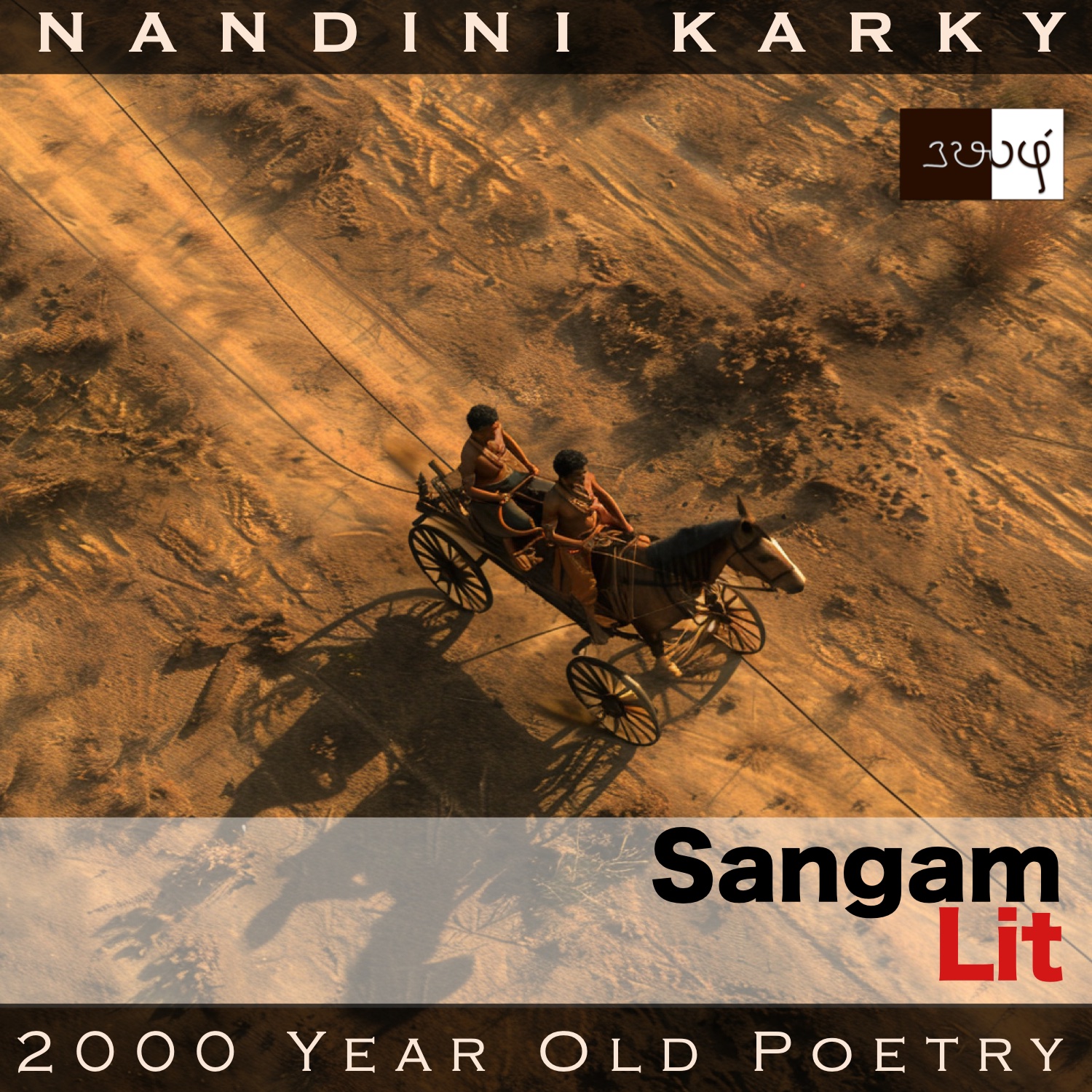Podcast: Play in new window | Download
Subscribe: Apple Podcasts | Spotify | Amazon Music | Android | iHeartRadio | TuneIn | RSS | More
In this episode, we perceive an exquisite moment of anticipation, as portrayed in Sangam Literary work, Aganaanooru 9, penned by Kallaadanaar. The verse is situated in the ‘Paalai’ or ‘Drylands landscape’ and depicts the emotions in coming home to a beloved after a long separation.

கொல் வினைப் பொலிந்த, கூர்ங் குறும் புழுகின்,
வில்லோர் தூணி வீங்கப் பெய்த
அப்பு நுனை ஏய்ப்ப அரும்பிய இருப்பை,
செப்பு அடர் அன்ன செங் குழை அகம்தோறு,
இழுதின் அன்ன தீம் புழல் துய்வாய்
உழுது காண் துளைய ஆகி, ஆர் கழல்பு,
ஆலி வானின் காலொடு பாறி,
துப்பின் அன்ன செங் கோட்டு இயவின்,
நெய்த்தோர் மீமிசை நிணத்தின் பரிக்கும்
அத்தம் நண்ணிய அம் குடிச் சீறூர்
கொடு நுண் ஓதி மகளிர் ஓக்கிய
தொடி மாண் உலக்கைத் தூண்டு உரல் பாணி,
நெடு மால் வரைய குடிஞையோடு இரட்டும்
குன்று பின் ஒழியப் போகி, உரம் துரந்து,
ஞாயிறு படினும், ”ஊர் சேய்த்து” எனாது,
துனை பரி துரக்கும் துஞ்சாச் செலவின்
எம்மினும், விரைந்து வல் எய்தி, பல் மாண்
ஓங்கிய நல் இல் ஒரு சிறை நிலைஇ,
பாங்கர்ப் பல்லி படுதொறும் பரவி,
கன்று புகு மாலை நின்றோள் எய்தி,
கை கவியாச் சென்று, கண் புதையாக் குறுகி,
பிடிக் கை அன்ன பின்னகம் தீண்டி,
தொடிக் கை தைவரத் தோய்ந்தன்றுகொல்லோ
நாணொடு மிடைந்த கற்பின், வாள் நுதல்,
அம் தீம் கிளவிக் குறுமகள்
மென் தோள் பெற நசைஇச் சென்ற என் நெஞ்சே?
Back to the drylands in this verse, and in this instance, in contrast to the usual mood of sorrow in separation, we experience excitement and joy. Here, are the words rendered by a man, returning home from his mission, in the earshot of his charioteer:
“Akin to the sharp and short arrowheads, skilled in their task of killing, standing tall on the edges of arrows, bulging in the quivers of bowmen, buds of the ‘Mahua’ have bloomed. Akin to copper slates, hang the red leaves all around, and within them, extend the flowers’ sweet hollow tubes, akin to butter, and appear with fuzzy holes on the surface. Loosened from their stalks, these fall with the wind, akin to hail from the sky, and land upon the coral-like red mounds of earth, and appear akin to fatty meat atop blood!
In a beautiful, little hamlet within such a drylands, the sounds of maiden with fine, curly hair lifting their well-etched pestles and pounding against the mortar resound in rhythm with the hoot of the owl living in the tall mountain nearby.
Even when the sun has set, disappearing behind that mountain, losing its strength, without thinking, ‘the town is far away’, we journey on ceaselessly, stopping not our speeding horse. Even faster than us, hastening with strength, that heart of mine reaches my fine home, soaring with many glories, where my lady stands still in one spot, listening intently to the sounds of the lizard, in that evening hour, when calves return home from grazing.
Did it go near her with extended hands and close her eyes from behind?
Did it caress her long, thick braided hair, akin to a female elephant’s trunk?
Did it lose itself in those bangled hands?
I wonder what that heart of mine, which desired so much for the soft arms of that young maiden of sweet and beautiful words, with a shining forehead and a flawless chastity fused with modesty, did when it saw her!”
Let’s delve deeper into the verse! The man starts with a description of the drylands, and to do that, he talks about the sharp-edged flowers of the Mahua tree, looking like arrowheads, skilled in the art of killing, and the long hollow tubes of the flower, appearing akin to butter, and the way these flower clusters fall on the red earth beneath, looking like fat on blood. In Freudian style, we can infer from these similes: One, the man is returning from some war mission and two, he’s hungry and eager to savour the feast back home. Returning, the man connects how in these drylands the sounds of women pounding on their stones joins in rhythm with the hoots of owls in the nearby mountains.
After describing the place, now the man turns to talk about the time of the day and says how even though the sun has bid bye to the land and retired beyond yonder mountains, he stops not his horse but speeds on. However he notes that the curious thing here is that even faster than the man and his chariot, the man’s heart has sped on to his home, and found his wife, who was standing still and listening to the good omens from the clicks of the lizards. The man wonders if his heart went on and hid the eyes of his beloved from behind or whether it caressed her long tresses, akin to an elephant’s trunk, or whether it buried its face in her bangled hands? He ends his words in utter amazement, pondering on what his heart might have done, when it reached the arms of his beloved!
In the unique Sangam style, the man separates himself from his heart to express his deep yearning to be with the one he loves. It’s also a hidden nudge to his charioteer to hasten their return home. The verse brought in my mind’s eye the many scenes of reunion I have experienced and witnessed while waiting in airports and train stations. The sparkling eyes, embracing hands and even tears of joy that spill unchecked… All echo aloud the truth that be it in the eyes of this man from two thousand years ago, speeding on his chariot, or an astronaut, zooming back to earth on her space ship, what a delicious human emotion, homecoming is!




Share your thoughts...